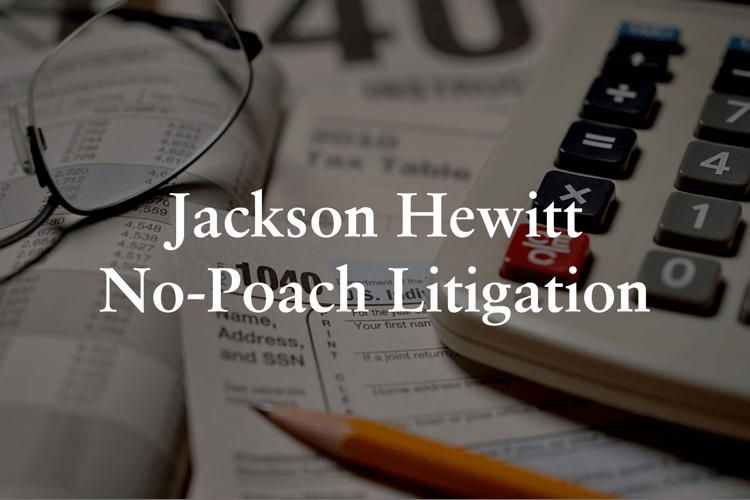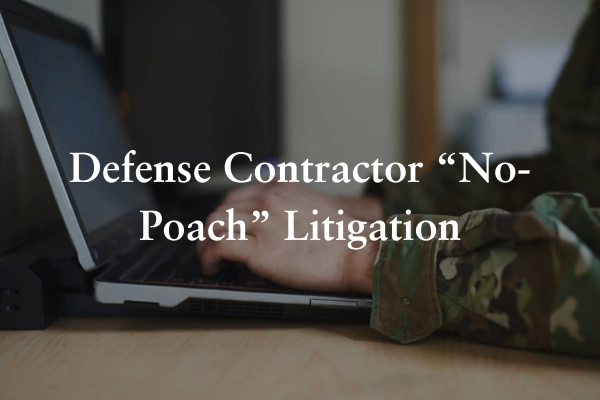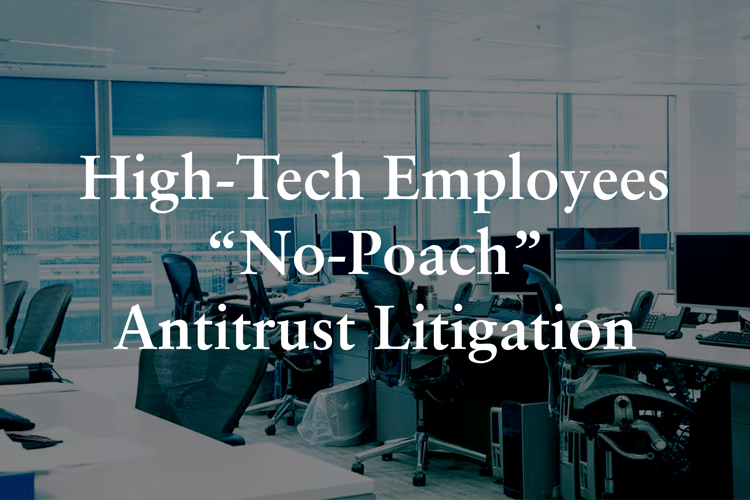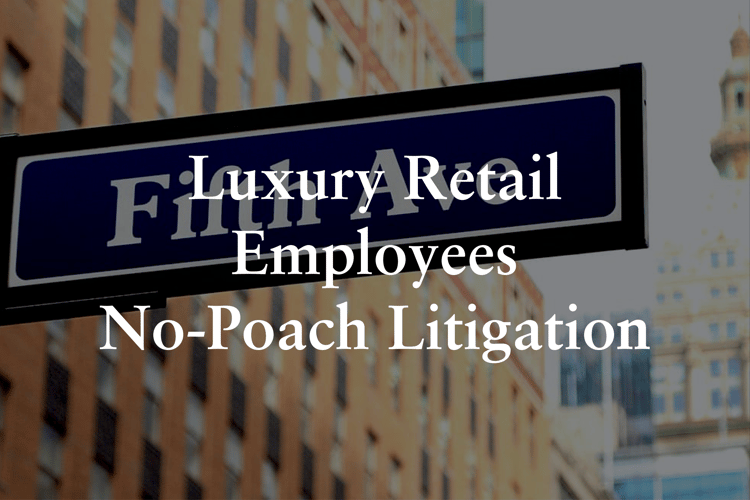The most important capital for any business is its employees. A strong marketplace relies on fair business practices, transparency, and productivity. The attraction, hiring, and retention of skilled employees is often what separates a successful business from its competitors. A properly functioning labor market ensures that employees receive the true value of their skills and talents. It also allows them to pursue and achieve their career goals. The proliferation of no-poach agreements is at odds with these free market objectives for employees or labor.
The Joseph Saveri Law Firm, LLP is globally recognized for our antitrust work and has recovered billions of dollars for classes of consumers and individuals. With a winning record of obtaining compensation for those injured, we prosecute cases in a variety of industries. We have the resources, skills, and track record to take on the tech giants of Silicon Valley and other businesses. We represent individuals and classes of plaintiffs against illegal no-poach agreements and anticompetitive behavior.
WHAT ARE NO-POACH AGREEMENTS?
A no-poach agreement is an illegal deal between competitors where they agree not to hire, recruit, or pursue each other’s employees. Anticompetitive agreements can be verbal or written promises to avoid contacting a competitor’s employees, agreements not to hire, or agreements not to match offers made by competitors. Generally, they are made between managers and executives without the knowledge of the employees. Frequently, they are made by top executives and are referred to as “gentlemen’s agreements.”
No-poach agreements restrict employee mobility and prevent them from obtaining fair wages in a competitive market. By restricting mobility, these agreements do permanent and irrevocable damage to career goals and developments. They also eliminate competition, and they prevent employers from obtaining competing offers, which are used in obtaining better compensation from current and future employers. The implementation of illegal no-poach agreements is widespread and on the rise. No-poach agreements are found in nearly every industry across the world. The most common sectors affected by no-poach agreements are technology, healthcare, government contractors, and professional services.
Our experienced attorneys are at the forefront of this conflict and our record of successfully obtaining landmark results in these cases illustrates our commitment to protecting employees, no matter the company size or industry.

HOW ARE NON-COMPETE AGREEMENTS DIFFERENT?
Similar to no-poach agreements, non-compete agreements are used by many businesses. The difference is that a no-poach agreement is between companies competing for employees, while a non-compete is between employer and employee. The purpose of a non-compete agreement is to prevent an employee from joining a competitor within a specific geographic area and/or time frame. While non-compete agreements are often under the guise of protecting the business, they can be seen as limiting individuals from pursuing better opportunities. A number of states have laws that control or restrict such agreements.
Our antitrust attorneys are aware of the challenges presented by non-compete agreements. There are many jurisdictions that do not recognize non-compete agreements as enforceable. President Biden’s executive order encourages the Federal Trade Commission (FTC) to ban or limit non-compete agreements. In March 2022, the Department of Justice (DOJ) and Labor Department signed a memorandum of understanding to strengthen their partnership in the vigilance of the labor market against employer collusions. In 2023, the FTC unveiled a Notice of Proposed Rulemaking that would ban companies from entering into non-compete agreements with their workers and void all existing post-employment non-compete agreements and on April 23, 2024, the FTC issued a final rule banning many non-competes nationwide.
Employers should prepare for potential changes. Our firm is well-equipped to handle the individual or class action suits in relation to fighting against unfair non-compete agreements.
DOJ AND FTC EFFORTS TO STOP THESE AGREEMENTS
The DOJ and FTC have publicly stated their intention to crack down on illegal no-poach hiring agreements. Until recently, the DOJ had generally only pursued civil penalties against offenders. In a recent pivot, it has brought its first criminal no-poach cases against organizations and certain top executives in many years, alleging they made illegal agreements with their competitors to keep wages stagnant and prevent the solicitation of each other’s employees.
In 2016, in conjunction with the FTC, the DOJ issued guidelines for HR professionals that would help them avoid potential violations of antitrust laws in relation to the use of no-poach agreements. The guidelines describe these agreements and explains how they violate antitrust law.
According to the guidelines, the DOJ "will criminally investigate allegations that employers have agreed among themselves on employee compensation or not to solicit or hire each other's employees. And if that investigation uncovers a naked wage-fixing or no-poaching agreement, the DOJ may, in the exercise of its prosecutorial discretion, bring criminal, felony charges against the culpable participants in the agreement, including both individuals and companies."
The guidelines warned that the DOJ and the FTC could bring criminal charges against C-suite executives, managers, and recruiters who initiate illegal no-poach or anticompetitive agreements.
In January 2021, the DOJ announced a grand jury indictment of Surgical Care Affiliates LLC (SCA), operators of outpatient medical centers around the country. The suit alleged that SCA violated Section 1 of the Sherman Act by coming to a secret agreement to not solicit senior-level employees from its competitors. This case was the first time the DOJ had filed a criminal no-poach case in many years. DOJ subsequently moved to dismiss the indictment in November 2023.
On April 23, 2024, the FTC voted to ban nearly all non-compete agreements. The FTC estimates about 30 million people, or one in five American workers, from minimum wage earners to CEOs, are bound by these agreements and that the decision would lead to the creation of 8,500 start-ups in a year and up to $488 billion in increased wages for workers over the next decade. Some non-compete agreements affecting senior executives can remain in effect, the FTC said, but employers are barred from trying to impose new agreements on any employee, including executives. Legal challenges may delay or block the FTC’s final rule.
JOSEPH SAVERI LAW FIRM, LLP LEADS THE FIGHT
Our firm is co-lead counsel in the antitrust suit In re Outpatient Medical Center Employee Antitrust Litigation, No. 1:21-cv-00305, in the U.S. District Court for the Northern District of Illinois against a number of defendants including SCA; United Surgical Partners International, and at least one other unnamed health care provider.
The no-poach team, led by firm founder Joseph Saveri, has established itself as an antitrust powerhouse, leading the way with groundbreaking and landmark cases. This includes their work in the 2010 civil complaints against Silicon Valley heavy hitters Apple, Google, Intel, Adobe Systems, Pixar, Lucasfilm, and other tech companies for entering into “no cold-call” agreements. These constitute no-poach agreements because the companies agree to not initiate contact with one another’s employees and to notify each other if an offer is extended. The settlement of the complaints cost the defendants more than $400 million dollars.
WHAT’S NEXT?
No-poach agreement issues are not isolated to the United States. Countries around the world are taking action.
- Japan: The Japan Fair Trade Commission published a report that assessed hiring practices and identified behavior that was potentially problematic.
- Hong Kong: Following numerous complaints, the Hong Kong Competition Commission released an Advisory Bulletin.
- Europe: Spain, Netherlands, and Croatia have investigated the harmful effects of no-poach agreements, specifically in freight forwarding, hospitals, and IT. The European Commission has not issued official guidance, but the environment is rife with the chance employers could run afoul of EU antitrust laws.
Since 2012, roughly 100 cases have been brought against various employers including:
- U.S. v. Knorr-Bremse AG and Westinghouse Air Brake Technologies Corp, No. 1:18-cv-00747-CKK
- Seaman v. Duke University, No. 15-cv-00462
- Harris v. CJ Star, LLC, 2:18-cv-00247
- Richmond v. Bergey Pullman, Inc., No. 2:18-cv-00246
- Stigar v. Dough Dough, Inc., No. 2:18-cv-00244
- In re High Tech Employee Antitrust Litigation, No. 11-CV-2509-LHK
CONTACT THE JOSEPH SAVERI LAW FIRM NO-POACH LAWYERS
The Joseph Law Firm, LLP is committed to keeping America’s workforce competitive and fair. We go above and beyond to protect workers’ rights and ensure corporations cannot take advantage of their employees.
Please contact us if you or a loved one has been harmed by illegal no-poach or non-compete agreements. We will answer your questions and evaluate your situation without charge, and any conversations will be kept confidential as provided by law. We are here for you when you need us.







